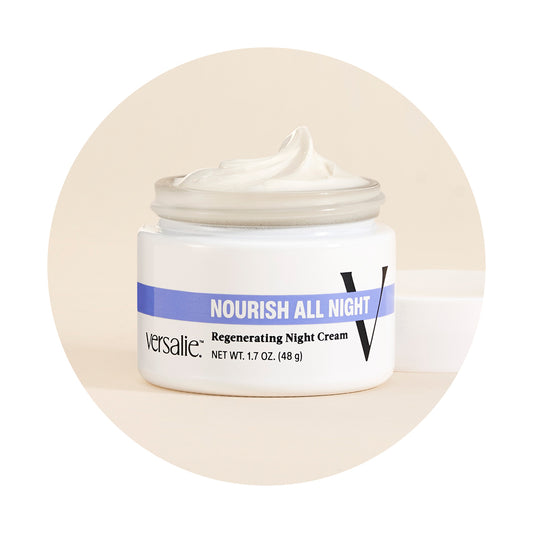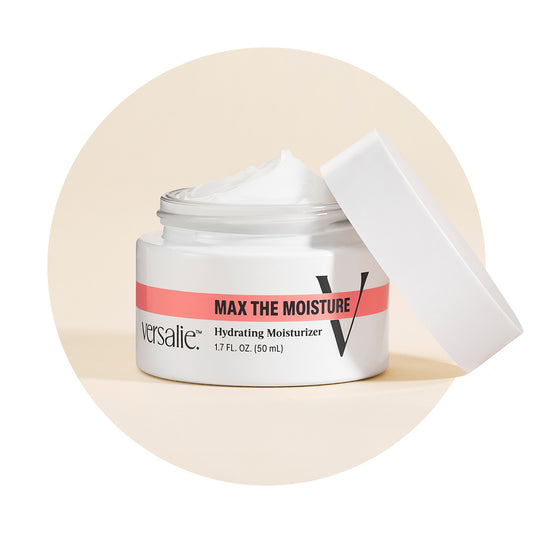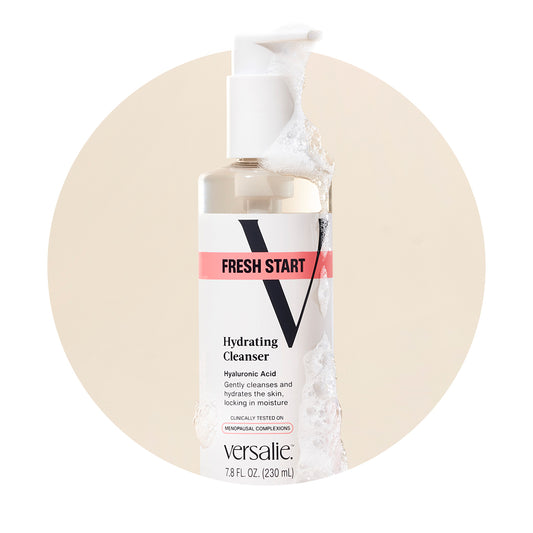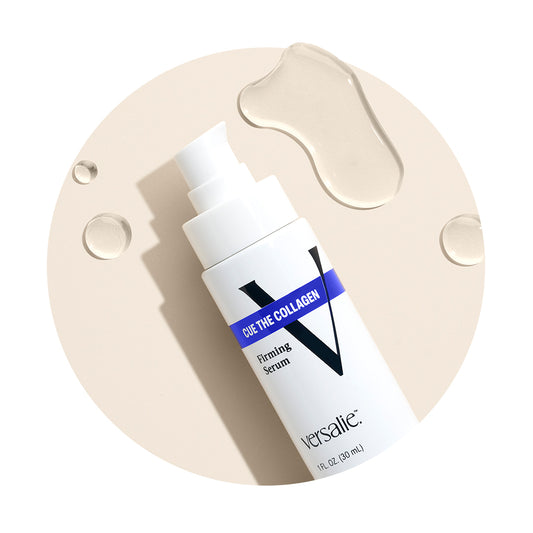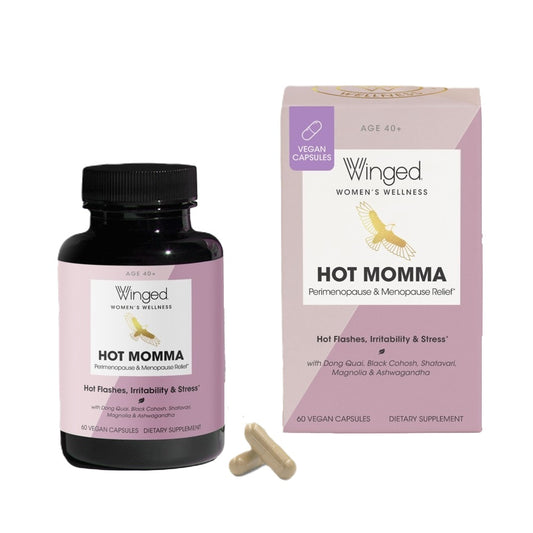The Versalie Ambassadors are a group of everyday people who are currently experiencing the ups and downs of the menopausal transition. They’ve been working with us to help build Versalie. Their experience and insights help us test our ideas, learn, and improve what we're creating. Their stories have the power to create real change.
We hope you see yourself in their stories — their symptoms, their highs and lows — and find that you’re not alone in this beautiful (but sometimes chaotic) phase of life.
Versalie Ambassador – Xenia, age 47
Perimenopause, started at age 45
5+ symptoms, including hyperpigmentation, mood swings, hot flashes, night sweats, and irregular periods
When and how did you first realize you were in perimenopause?
The first sign I always refer back to was 2 years ago, I developed melasma — I had no idea what it was. I called it my ‘sun stache’ — which turned out, I learned, to be caused by hormones. And then right after that, within 6 months to a year, mood swings followed. I thought that was normal and didn’t think ‘perimenopause’. Then after that, the hot flashes, night sweats.
Not knowing that I was going into perimenopause at this stage, I was asking my friends (my girlfriends that are all the same age, I call them my sister friends) and my mom, “What's going on in your body? How are you feeling?” so I could figure out if this was menopause.
You mentioned a few of your symptoms. Can you talk more about them and how they’ve affected you?
Overall, it has had an impact and I’m having a hard time.
The melasma made me develop what I call a hormonal mustache — it kind of traumatized me. I went to the dermatologist, got a laser peel, but when I kept looking into it, I realized that the deep cause is a hormonal imbalance. It happens when women are pregnant. The things I was looking at kept saying hormonal imbalance, but what does that really mean?
 Then I thought about how, when women get pregnant, our estrogen and progesterone are all over the place and when we go into menopause there’s a lot of changes in hormones. I have a friend who is starting perimenopause in her 40s and starting to develop melasma as well. So, I’m at least letting her know that this, I guess, is the beginning.
Then I thought about how, when women get pregnant, our estrogen and progesterone are all over the place and when we go into menopause there’s a lot of changes in hormones. I have a friend who is starting perimenopause in her 40s and starting to develop melasma as well. So, I’m at least letting her know that this, I guess, is the beginning.
As far as the night sweats, I thought I was just born like that — hot. Some days are good, some days are not good. With my menstrual cycle — some months are good, some months are not good, some months there’s less bleeding.
One other thing that I struggle with is that my son passed away and the mental health of being depressed. Right? That's one thing that I have to deal with for the rest of my life. But now going into menopause, I am so afraid that it would take me sometimes into a depression where I don't want to go, if that makes sense? I just want to make sure:
"Is it the menopause, or am I feeling depressed? Or is it both? Because, you know, it could be like a double whammy."
But now, it’s my mindset that things are because of menopause. Before, I thought ‘I'm just crazy. I'm just getting worse by age.’ I'm not saying this happens for all women, but for me, I'm thinking ‘Okay, I'm getting old. I'm getting cranky — this is what happens.’
But now, knowing that this is part of our life. It makes me really think, ‘Oh, maybe it's not just what happens. Maybe it's menopause.’ Now I just want to know more information.
What have you tried to do so far to manage your symptoms? Is there anything you’d like to try?
I’ve tried some meditation and yoga classes to see how I can calm myself, my nerves. Last year, I also tried acupuncture to help with the mood swings and night sweats. But it didn't work. Nothing went away, so I was like, alright, I’m not going to spend more money on that. But I at least I tried it.
I want to address the cause of the melasma — hormonal imbalance. I don’t like the idea of going on meds, but I will consider it if it helps.
I’m open to explore options to manage my symptoms. My attitude is “If it works, let’s go for it. I’m for being 100% feeling better.”
Have you talked to a medical professional about your perimenopause symptoms? How’d that go?
After realizing what I was going through was probably perimenopause, the next time I went to my PCP and OB-GYN, I asked specifically — let's do some hormone testing, let me know what stage I’m in, stuff like that.
With other doctors, their response was not very specific. They would just mention menopause is an age range. If I didn't bring it up, they would never have mentioned it. They asked questions like: What age are you? And what are your hormone levels? And what are the symptoms?
 Then they would say, “Ok, maybe you’re in perimenopause.” They'll write it down, but not be too specific. I want a doctor who really knows, who is knowledgeable and can say whether I would need to start hormone therapy or not.
Then they would say, “Ok, maybe you’re in perimenopause.” They'll write it down, but not be too specific. I want a doctor who really knows, who is knowledgeable and can say whether I would need to start hormone therapy or not.
So far, they’ve just told me to come back if it really bothers me and they’ll look into it. I get it that they don’t want to prescribe too many medications — like only take it if it really bothers you.
I just started seeing a new physician and we’re going to talk through my bloodwork. She put as the diagnosis — perimenopause — and I was like ‘oh, wow!’ - it was crazy to see it in writing! I want to ask my primary care provider and my OB-GYN if the bloodwork results are all related to menopause.
Did anyone talk about menopause growing up? Did anyone talk to you about menopause before it happened?
My mom and aunts didn’t speak about it and just kind of said, “This is the change. It happens.”
Maybe they didn't have information about it. Maybe they were scared. They just didn't address it until recently. When I mentioned changes to my family, they were like “Oh yeah, that’s the age it happens.”
I was like “Hello?!?! Was anyone going to tell me what’s going to happen?”
Growing up I saw that you just get cranky as you get older. That’s what my aunts and grandma said, that’s what they knew. They didn’t explain why you get more cranky. They just said, “It’s gonna be a change.”
Women years ago — it doesn't matter my culture, any other culture — they just didn't talk about it. Maybe they didn't have information, or they felt shameful.
I think, back in day, the doctors also didn’t get a lot of menopause information in school. They spent their whole life delivering the babies, not spending as much time on menopause. Their approach felt like, “Yeah, after 40, they go through changes, and they lose their period. And that's it.”
What role have your family, friends, and partner played in your menopause journey? Have you seen any changes in those relationships?
There are a few people that support me. I live with my husband and my mom. I talk to my mom, and she asks a lot of questions. I’m sharing my journey with her.
My husband is not too involved. He’s maybe the typical guy — checking in: “Are you still menstruating? Because your mood swings are still there”. He wants to make sure it’s not serious. But if it’s “regular women stuff” I don’t tell him too much. But if it’s something serious, then I could let him know. He also understands that I’m not crazy.
Menopause hasn’t affected our relationship too much. It affects us in ways like when I have the A/C blowing, and he's freezing. I tell him it's because of menopause, because he says I’m always hot now and I was never like that. But now my house always has to have A/C on. Like today in New York, they're saying it’s 60/70 and my A/C is still gonna be blasting. It doesn’t matter.
Now that I'm learning more about menopause, speaking about it, I'm happy to share the news with my friends, and if they're going through anything, I like to let them know any information I know, the journey that I'm going through.
I think it’s had a positive effect on me and my friends. As I learn more, they’re asking, “Tell me what happened” and will follow-up on things I told them before. I’m learning and sharing all my information.
At first they were a little surprised - “Oh, you’re talking about it? We never talked about it before.” It was considered taboo, but now I’m asking ‘Why?’.
"Let’s talk about it. We don’t need to scream it to the world, but it’s nothing to be ashamed of."
What I wish I knew: What would you tell your younger self about menopause if you could go back in time?
That it's gonna happen once you get older. After you have babies, like, give us a timeline. After the 30s or 40s, don’t start freaking out. They were so vague with “the change” and you're thinking “What change?” Give us the whole package — physical, emotional, mental, everything.
Are there any misconceptions, myths, or stigmas about menopause that you want to debunk or clarify?
The myths came about because people before didn't want to talk about it. I would hear “Don't worry about it. It's just a change, it's normal.” I mean, it is normal for us to go through it. But our symptoms or changes could be different from other people. We’re not all going to experience it the same.
Everybody is an individual, and you could go through it worse than I might. Maybe everything makes you cry, but I don’t experience that. I have other symptoms.
What advice would you give to others starting or going through the menopausal transition?
Just don't be afraid. Notice if you feel any different changes from what you already go through, be mindful of anything that comes up new that you've never experienced before. Like for the hot flashes or more irritability, maybe write it down so you can compare how you were in your 20s and 30s. And compare to coming into your 40s, maybe feeling like a raging bull. Comparing may help you think, “Maybe I'm going through menopause. And if you want to talk to someone, talk to someone or ask your doctor. Don't go into this not wanting to know and thinking that you have to suffer through the symptoms.
What's an unexpected improvement in life now, as you’re aging and going through perimenopause?
That we're maturing, that us women, we’re maturing. And this is another phase for us to evolve.
I also feel more comfortable and confident in myself. And seeing that other women in my age group are going through something, going through menopause. So now I feel confident to reach out — say ‘this is what’s happening, and you should look into this or that.
Why did you want to become a Versalie Ambassador?
I wanted to be an Ambassador because I’m actually going through it. I’m experiencing all the symptoms. And no one wants to talk about it.
"Everybody talked about the birds and the bees and puberty but when women go through menopause, it’s such a taboo, nobody wants to talk about it."
I would like for my nieces and other young females to know exactly what’s going to happen. I want to sort of guide them through it. I want to be part of a new menopause movement.
What’s your favorite part about being an Ambassador?
Gaining more knowledge, learning more, but also the chance to raise awareness. I want to be part of a team or new movement. When I think about my nieces, and the younger generation, I don’t want them to be ashamed. Let them know that after puberty, after pregnancy, guess what? Women are going to come into menopause — don't be afraid.
I'm so happy to advocate, raise awareness that this is part of us, part of life. Let’s not be shameful.
What’s the biggest change you’ve made since joining as an Ambassador? What’s one thing you’ve learned about menopause that you think is critical to share with others?
The biggest change I see in myself is advocating for menopause — striking up conversations with family, friends, and coworkers. I’ve been having conversations with them about menopause, about symptoms, mood changes, weight issues. I’m letting them know it’s okay for us (women) to ask questions and want to seek out information — especially with the Versalie website and social platform.
In addition, I’m sharing with women to not be afraid or ashamed of knowing what menopause is. Women should ask questions of their doctors, friends, and family. I also tell them to do research online — the first website to go to is Versalie because they’re covering all the topics we want to know more about in regard to menopause.


